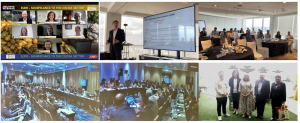
HERE BE DRAGONS
Dear Members & Friends of the Cocoa Association of Asia (CAA),
In the Middle Ages, map makers used to draw illustrations of dragons and monsters on the uncharted areas of these maps to indicate potential dangers in unknown territories. One could not think of a better analogy to reflect the current cocoa market environment: Unchartered territories.
Cocoa price is at an all-time high. The frenetic rally of the terminal market in the past week has left many of us bewildered.
Cocoa bean deficit has been looming for a while, and it is becoming a reality. The industry wonders what a world without enough cocoa would truly mean.
Ambitious legislation such as the new EU Deforestation Regulation (EUDR), effective at the end of this year, will undoubtedly transform our industry. We are just starting to comprehend its implications.
Some veteran traders mentioned a “once in a generation” event. For sure, we are witnessing something unprecedented. We are entering the unknown. Chilling and thrilling at the same time: But is that not what cocoa has always been about? 🙂
In this context, the CAA stands by its members – and has pursued many initiatives initiated last year to support you:
- Flagship Education Program: “Introduction to Cocoa Trading” drew 40 participants from 12 countries, fostering a vibrant atmosphere of teaching, learning, and knowledge sharing. The enriching discussions sparked during the program undoubtedly resonate till today. Watch the video highlights [LINK]. And the journey doesn’t end here – we are excited to announce the expansion of our curriculum with an upcoming course on “Advanced Cocoa Trading.” Stay tuned for more updates!
- Prepare for EUDR: CAA hosted two sessions to help your organizations prepare for this transformational regulation – A webinar [LINK] with a panel of experts, and a lunch & learn session with ICE.

- Unified Advocacy to Regulators: Recently, CAA participated in the Joint Task Force Meeting, where government representatives from Indonesia, Malaysia, and the EU convened. Our aim was to ensure that cocoa remains a focal point of discussion amidst palm-centric conversations.
- Leading Change in Sustainability: We prepared the Asian Cocoa Paper, acknowledging that the industry needs Asian cocoa for the future and laying areas of pre-competitive collaboration in the areas of good agricultural practices and support to small holders. The CAA Sustainability Subcommittee will spearhead a select number of decisive actions.
- CAA INTERNATIONAL COCOA CONFERENCE: Of course, what is cocoa without forecasting? The highly anticipated bi-annual CAA International Cocoa Conference is set to be the highlight of 2024. What an exciting program and line up of guest speakers and exhibitors! With the theme of “A Confluence for Positive Change”, we are excited to host you in Singapore from 12-13 September 2024. I am looking forward to meeting all of you – registration is now open, sign up via this link today.
On behalf of the CAA Team, I wish all our members and friends an auspicious and prosperous Year of the Dragon!


